Nearly 1 in 5 eBay auctions fraudulent?
 sc999
Posts: 47 ✭✭
sc999
Posts: 47 ✭✭
A few years ago I started noticing an issue with the search for US Coins on eBay being clogged with hundreds of blatantly fraudulent auctions. These were offered by a multitude of vendors with zero record of sales and followed a clearly recognizable pattern.
Today the issue seems to have reached critical mass - clusters of these listings dominate the search feed with sometimes up to several ending every minute.
The seller accounts in question must be stealth or burner accounts purchased - by the hundreds - from online repositories. They appear to be operated by a common person or group. The defining characteristics of the operation are as follows:
- Common pocket change
- Starting bid in the $100-2500 range
- Account with zero seller feedback; newly-active
- Only one (sometimes 2) listing for sale per account
- Username often a jumble of random letters and numbers
- Common circulating coins listed for exorbitant prices
- Poor quality photos
- Auction title is vague, nondescript, pithy; improper use of capitalization
- Titles spam certain keywords (Coins, US, Lot, Error, Rare)
- Titles often unrelated to the coin pictured
- Repetition of exact keywords in titles across different seller accounts
- Auctions ending in time clusters yet from all different sellers accounts
- Listings ending at all times of the day
- Item locations often rural, obscure, low population
Examples from a recent cluster of auctions repeating similar language in titles:





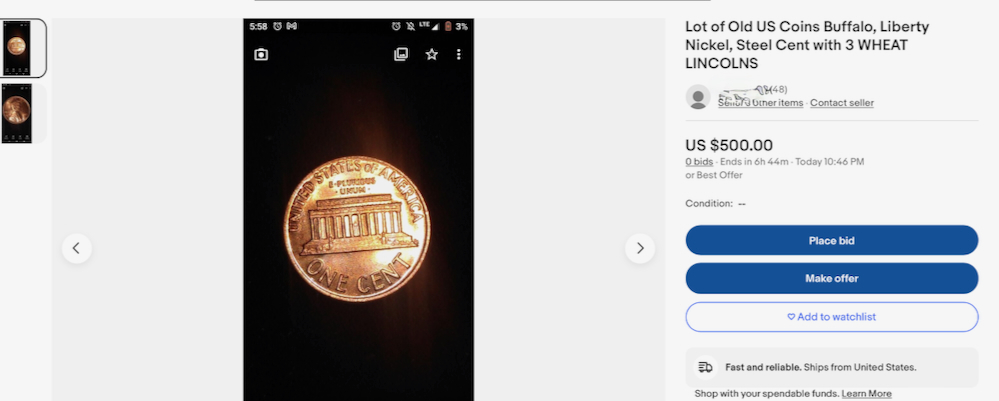


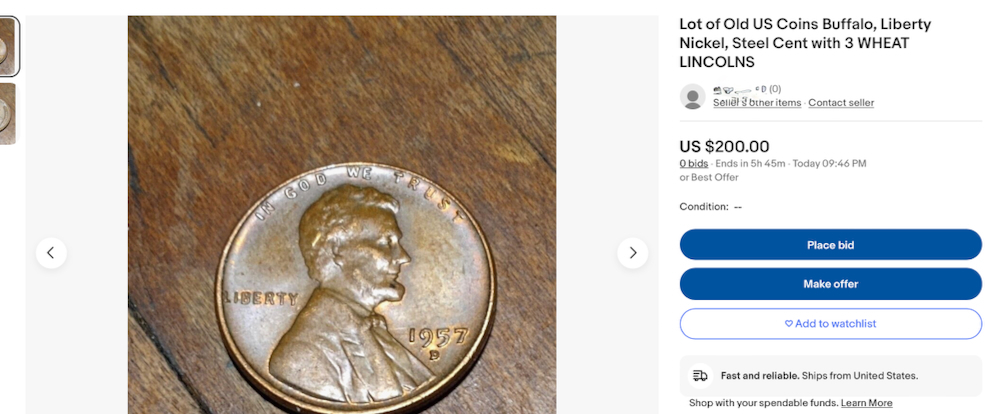

Searching the category today (AM EST), more than 1 in 5 auctions ending in US Coins meet the above-mentioned criteria. This cluster ended within a 5-minute window:
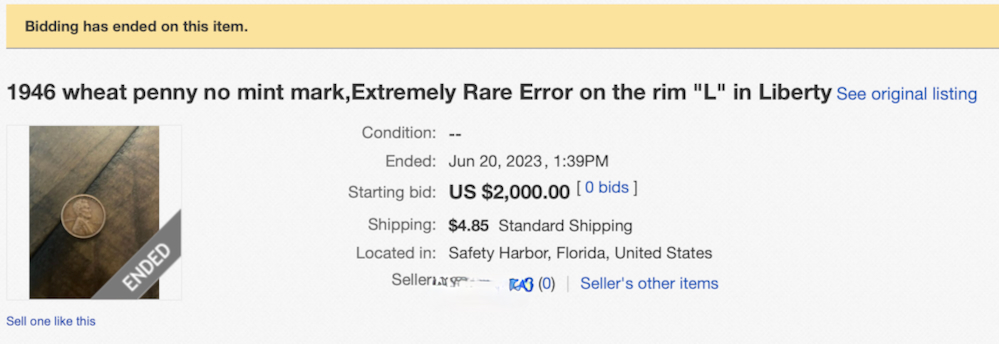
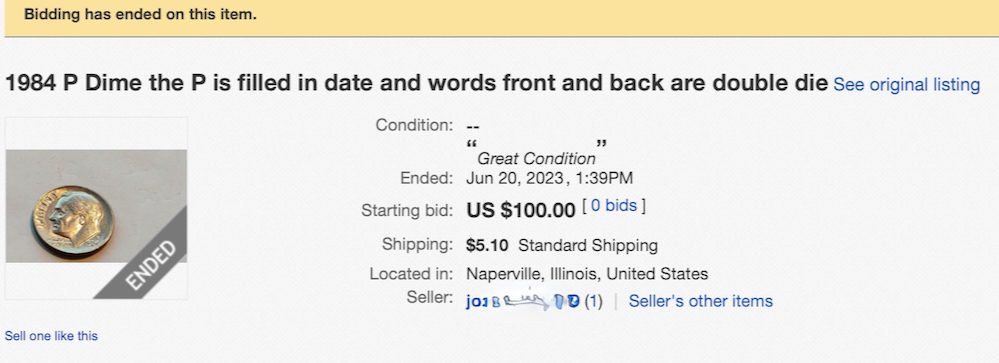

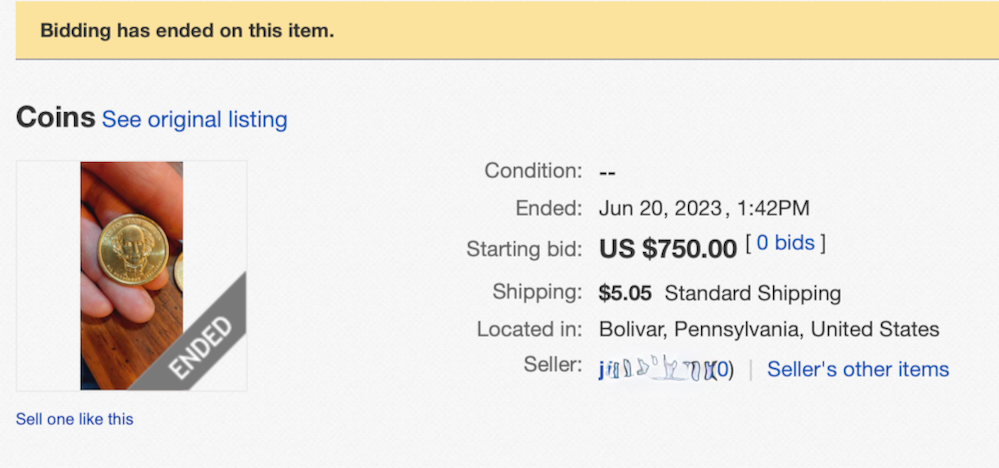
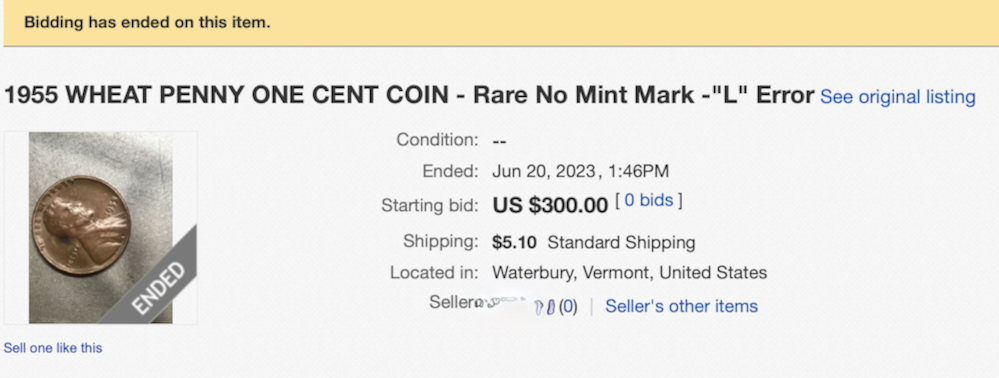



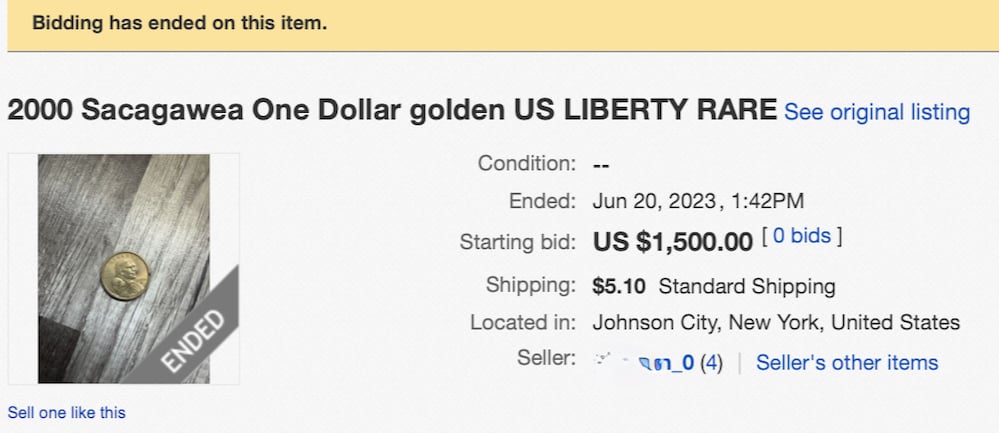

So some entity appears to have developed the means to blitz the US Coins category with hundreds of auctions a day across multiple sock-puppet accounts, while avoiding IP detection by eBay. Moreover, it knows how to game the search algorithm. Now, seldom do the auctions in question receive a bid and even the least savvy buyer should detect something wrong with them. So, what might be the goal of such an operation?
I have attempted to bring this to eBay's attention several times in the past, but was never able to successfully penetrate the bureaucracy. It's hard to believe eBay wouldn't notice spamming of this magnitude and shut it down.
Maybe these assumptions are entirely wrong and each day hundreds of real people across the US all of the sudden decide to fire up years-dormant eBay accounts to try their luck at selling a piece of pocket change for big bucks? Seeking opinions.
Comments
I get the same search results.
eBay needs to fix this.
It's probably just the category I search in
Just now, I tried an ebay search on "coins", and it showed me 56 lots of mostly US coins, with only one that was a "fantasy price".
Maybe you have your sort criteria set to "Price + Shipping: highest first"?
Mine is set to "Best Match".
I call these "fantasy price" rather than "fraud", because I guess these would-be sellers are hoping to make a sale for much more than they paid.
Fraud would imply an intent to deceive, which I don't think is usually the case, other than misusing the word "rare", which seems to be common practice on ebay.
I see a lot of "fantasy price" listings on places like craigslist.
I think it just means the seller doesn't really know the coin market.
Hummmmmmmmm
I practically live on eBay and have for the last 5 years. I can’t say as I noticed anything blatantly wrong. Ofcourse, I’m old😂
🎶 shout shout, let it all out 🎶
I prefer Auctions Ending Soonest to Best Match. But what we are talking about here goes way beyond "fantasy price". Very important to understand, none of these accounts are real people. Try this: https://ebay.com/b/US-Coins/253/bn_1848949?rt=nc&mag=1&_dmd=1&_udlo=75&LH_Auction=1&_sop=1
Same from earlier today (see above) different account, different time:

Money laundering.
This.
K
I see, too often, modern/current presidential dollars represented as 18th and 19th century gold dollars.
That would certainly explain the 3 to 7 bogus auctions of 2000-P Sacagawea Dollars PER DAY, some saying "Cheerios" and some not.
Perhaps the scammers look for common dates that have a rare variety within that date that list somewhere at a high price, in the hope that some sucker will think "Well gee! If it is priced like the rare variety it must BE the rare variety! A-yuk!"
This was my initial thought, but these auctions seldom receive a bid. If money laundering were the case, why take the effort to make a thousand nearly-identical decoy auctions when a single auction for some random computer part would be way less conspicuous?
"Shoot for the moon!". Ebay should be able to identify fraudulent or abusive spam listings and then debit the lister or just shut them down.
It's not justs coins, try searches for micro sd cards and the like. There will be 50 new accounts with 0 or 2-80 feedback all with 2-5 negative feedbacks saying the very items you are searching were defective, didn't arrive or weren't what the buyer bid on.
Jim
When a man who is honestly mistaken hears the truth, he will either quit being mistaken or cease to be honest....Abraham Lincoln
Patriotism is supporting your country all the time, and your government when it deserves it.....Mark Twain
It's a huge problem and very much grown in the last couple of years. And no matter how many I report- eBay does nothing.
WS
It seems the scammers' system is advanced enough that they can program accounts to list automatically, pulling random keywords together in titles. My guess is the pictures are also randomly selected from a database. There is not an actual coin to be shipped. Each listing is a one-off. Collect from sale, ditch account then repeat.
How the scammers connect a bank account for Payouts is something to ponder though. eBay's new feature of allowing sellers to shop with proceeds of sales could be a potential workaround.
Fools the Al-Gore-Rythms and it makes it appear normal.
The thread title is click-bait. Ebay has billions of listings and I don’t see how this sample represents the whole.
The original post seems to originate from paranoia and conspiracy-theory dwelling rather than fact.
I think 20% is a little high.
As I type this more than 1 in 5 coins (priced over $75) ending in the next 2 minutes are from the bot farm: https://ebay.com/b/US-Coins/253/bn_1848949?rt=nc&mag=1&_dmd=1&_udlo=75&LH_Auction=1&_sop=1
I see them too. All newer coins, like Sacs, unc zincolns and RARE RARE RARE.... yeah, my arse.
Clogs the system. Many are real people just caught up in the wave and don't know crap about coins. I message lots of them and a few actually respond and have a conversations,,,, most don't.
bob
It all started when Ebay made it too easy to register as a seller, and also when they made listings free. Case in point, a number of years ago, a friend's 8 year old daughter made an account from his phone and started listing random toys for sale.
Early American Copper, Bust and Seated.
Money laundering is an interesting angle and now that I think of it, probably so on some items.
I 100% for sure saw it one time on online gambling on a high stakes between 2 players on a private table. They bid up the pot, and then the same person folded every time.
The novice sellers who have no idea what they're doing are quite different than the the bot-farm operation - 2 distinct categories of annoying, the latter more of a troubling matter.
Not if they are not attracting bids. If they are paying listing fees and not misrepresenting the item, why would eBay want to stop it?
Money laundering involves putting out dirty money and receiving clean money in return. Not putting out garbage and receiving clean money in return. That's called stealing, not money laundering.
But in this case, the pictures clearly portray garbage, so it's not exactly stealing.
I also don't get the point, other than to trap someone who thinks they see something that isn't there. But that's not eBay's problem, and eBay makes money by hosting listings, not by banning them.
Maybe on modern coins, I don't follow those. In my 19th century wheelhouse, it doesn't seem nearly that high.
Maybe, how about
CAVEAT EMPTOR. Everyone picking on eBay. eBay just kinda is. Thanks 🙏
🎶 shout shout, let it all out 🎶
One party advertises a $1 coin for $1,000. The other party buys said coin for $1,000 with dirty cash. Party receives money, pays eBay fees and pays taxes. Money is clean.
One party advertises a $1 coin for $1,000. Party overseas pays for coin and recipient pays taxes on it. Dirty overseas money is transferred to the US and a U.S. bank account and is now clean and is in the US to invest.
One party advertises a $1 coin for $1,000. Terrorist finder overseas pays for coin and recipient pays taxes on it. Terrorist cell now has $1,000 less taxes to fund operations.
The listings on eBay that aren't trying to convince you at all of an item's rarity - listings with no keyword-spamming and zero explanation of why a 1964 dime should be worth $2000, for example - are almost certainly money laundering.
It works something like this.
Suppose Criminals A and B want to do a deal - illicit substances or other contraband, transfer proceeds of crime, pay a people-smuggler, or what have you. Criminal A lists a common coin on eBay for the agreed-upon price, and tells Criminal B which coin they should go on eBay and "buy". Criminal B "buys" the coin and sends Criminal A the money. Now both Criminal A and Criminal B have "money from sale of rare coin" on their books, if any cops or tax agents come snooping. Criminal A probably won't bother actually sending Criminal B the "rare coin" in question, since Criminal B never really wanted the coin in the first place.
It works, because eBay allows the sale of raw coins under $2500 with very minimal restrictions. Over $2500, and raw coins are prohibited, and also must comply with eBay's bucketful of rules and regulations on raw coin sales. And to a casual non-numismatist observer, there's nothing at all unusual about "common coins" being sold for moon money - those crazy coin collectors pay crazy prices for common-looking coins all the time. The only people who would notice "something's fishy here" are actual coin collectors, and we're supposed to just point, laugh and then ignore such listings, rather than go and blab about them on an Internet forum.
Now, if random citizen C happens to come along and buy the coin instead, all the better - Criminal A doesn't care who pays the money, so long as they get paid, and Criminal B gets their illegal stuff for free. But C isn't the intended victim.
Not all these moon-money listings are money laundering schemes. Some are indeed scammers trying to extract money out of the "Facebook fools" who think every roadkilled coin is an amazing and unique mint error. Others are the Facebook fools themselves, who honestly and genuinely believe they have rare coins they want to sell (and may be having their foolishness reinforced by the bogus listings being put up by the scammers and money launderers). But the combination of these three groups of sellers can easily account for the proportion of "fraudulent listings" observed.
Roman emperor Marcus Aurelius, "Meditations"
Apparently I have been awarded the DPOTD twice.
Nobody is paying for those listings. You get a monthly allotment of free listings. EBay makes no money on those listings and has to spend time and effort to find and eliminate the botv sellers.
You need a new theory.
All comments reflect the opinion of the author, even when irrefutably accurate.
I understand. Are any of these listings ending with sales? Does eBay accept dirty cash as a form of payment? Where is the laundering?
Except where are the sold listings? This only works as money laundering if there is an actual sale and there doesn't appear to be many.
All comments reflect the opinion of the author, even when irrefutably accurate.
I get the theory. I don't get the practice. Are these listings ending in sales? If so, what form of "dirty money" payment does eBay accept? Bitcoin? Western Union? Prepaid debit cards bought with cash at Walmart?
Yeah. I don't see any real sales. And to your point, there aren't any obvious dirty money ways of paying. It would be much easier and less visible to launder cash the old fashioned way: through a cash business. The new fashioned approach would be using a digital currency. A fake eBay listing, especially one not resulting in a sale would be less effective and easier to trace.
All comments reflect the opinion of the author, even when irrefutably accurate.
I don't have a theory. I'm just questioning the money laundering angle.
Are these listings ending in sales, or not? If not, they are fishing expeditions, not money laundering schemes, regardless of whether or not the listings are paid for.
If eBay's business model involves free listings, so be it. They still have no interest in taking down listings because the asking prices are too high.
They do try to weed out fake accounts. We're only seeing the ones they didn't remove. It's not so simple to just purge all of them when the bots create them as fast a the ebay bots remove them.
I agree with you that money laundering likely isn't the answer.
All comments reflect the opinion of the author, even when irrefutably accurate.
I see hijacked accounts all the time. Usually on v75 gold* (typo corrected). The second image in the listing always has an email for direct contact and payment. I’ve emailed before and gotten the reply that they only have one left and “here’s how to pay”. Usually eBay takes these fraudulent listings down within hours.
🎶 shout shout, let it all out 🎶
Well list something!
All comments reflect the opinion of the author, even when irrefutably accurate.
JM. I’m really thinnin on it. Need a little more seed money and a proper printer 🖨. I’ve got buckets of inventory. I’m watching our friend @JoeyCoins and preparing to reenter into business. Been awhile.
I am hoping you and others here will help me with some sage advice and kindly provide guidance. I’ll be happy with the usual good natured banter.
🎶 shout shout, let it all out 🎶
Lol. I was mostly just pulling your leg. However I do think it is useful for people to explore the sales side of things.
All comments reflect the opinion of the author, even when irrefutably accurate.
Thanks for that. Perhaps I just needed a little push to get things going.
🎶 shout shout, let it all out 🎶
Common circulating coins listed for exorbitant prices are a nuisance, but they are not a real threat to collectors because the items typically do not sell. The threat to the hobby is the growing listings of slab and counterfeit coins on eBay.
I am more concerned by the exorbitant BIN listings on eBay by collectors and dealers as it has become difficult to find fair BIN prices on eBay. Most of these exorbitant BIN listing sit on eBay for months unsold. 5 years ago I was buying 80% of my coins on eBay and 20% at the auction houses. I am finding it difficult to get a fair price for a quality coin on eBay and I have turned to buying most of my coins at the auction houses.
Fortunately for us, here.... we're not wooed by modern crap. It's common crap, by now.
``https://ebay.us/m/KxolR5
I buy a lot off eBay no problems.
It's safe to say a lot us buy on eBay, no problems; but this - CAVEAT EMPTOR, common crap, our particular tastes in numismatics vs. plebeians and Facebook error idiots - are besides the point.
We're talking a large-scale bot attack on the US Coins category totally separate from the hoards of novices that also flood eBay with garbage. At any given minute, there are almost as many bogus listings (0 seller feedback) as real ones - anyone can see for themselves:
https://ebay.com/b/US-Coins/253/bn_1848949?rt=nc&mag=1&_dmd=1&_udlo=75&LH_Auction=1&_sop=1
The ratio of bogus to real should give pause. I actually consider it an advantage as a buyer - I can win bids at lower prices because the bogus listings dilute out the real ones. Doesn't this take away from sellers then? Real sellers competing with spam bots seems like kind of a bad deal.
Is the entire market being driven downward? Even small percentage points of decline would represent tremendous lost revenues for legit coin sellers and eBay viz-a-viz fees. Might also be a discouraging factor for someone like @Jzyskowski1 getting back into selling.
Regardless of whether the bots are harmful or not, it's always fun trying to figure out the who, what, where and why of a scam. The laundering angle is plausible, but there are too many holes in this theory as @NJCoin pointed out. Maybe @GoldenEgg nailed it and OP suffers from paranoia as a result of too much conspiracy-dwelling
I’m prepared for anything. Thanks 🙏 ( Jzyskowski is not smart enough to get scared of no ebayers)😉😂🤔
🎶 shout shout, let it all out 🎶
Precious metals have perennially been a popular way to launder illegal proceeds; one major dealer got caught selling gold bb shot for cash. I'd think that pms would be a more popular way to launder money or crypto.
If you want to read a mind boggling article on the current state of financial fraud and money laundering: https://www.yahoo.com/lifestyle/heists-worth-billions-sham-bank-133129184.html
@supercheezed @Vasanti
I believe that it's a huge problem that had very much grown in only the last few months.
I don't ever remember so many blatenly outrageous amounts for common coins flooding Ebay at the same time.
Pete
I've been following the bot scam for years. The last few months have been bananas.
If it was money laundering, they'd actually be selling. It's just uninformed folks trying to make a quick buck. Ebay has made it easier than ever to make an account and list something.
"It's like God, Family, Country, except Sticker, Plastic, Coin."